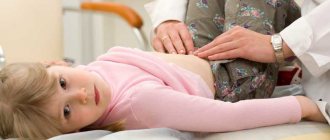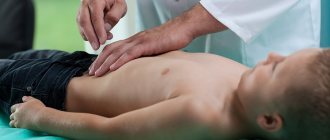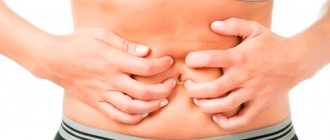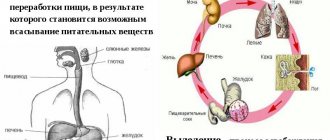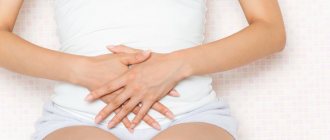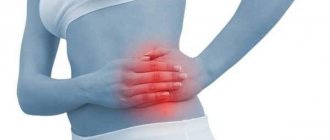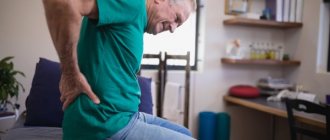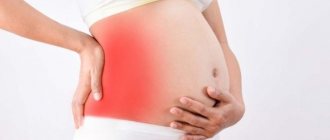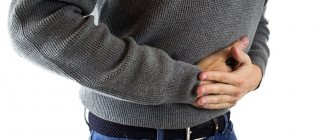Abdominal cramps and diarrhea are common manifestations of many pathologies that cause significant discomfort in a person. This state of health greatly impairs appetite and can provoke irritability. In this case, the patient’s health is greatly impaired and fatigue appears. What to do in such a situation? To avoid negative consequences, it is important to consult a doctor in time, who will determine the causes of this condition.
Types of diarrhea, causes
Indigestion may be accompanied by loose stools, abdominal discomfort, and a person's stomach turns. Based on the cause of its occurrence, diarrhea is divided into infectious and non-infectious. According to the form: acute and chronic. Before treatment, it is necessary to determine the diagnosis and establish the cause of diarrhea.
To make a diagnosis and identify the source causing loose stools, it is recommended to undergo a medical examination and laboratory tests. OBC, stool analysis, endoscopy, ultrasound, abdominal x-ray - these studies will help accurately diagnose the disease and apply appropriate treatment.
Factors that can provoke diarrhea are:
- Viruses, pathogenic microorganisms;
- Allergy to medications, food additives;
- Spoiled food, poor quality products;
- Psycho-emotional disorders;
- Hormonal imbalance, pregnancy;
- Gastritis;
- Ulcerative colitis;
- Appendicitis (acute pain in the lower abdomen);
- Inflammatory processes of the abdominal organs (cholecystitis, pancreatitis);
- Side effect on medications;
- Traveler's diarrhea and stomach malfunction are provoked by climate change and an unusual diet;
- Previous operations on the gastrointestinal tract.
Common causes are food poisoning and intestinal infections. Each case requires an individual approach to treatment. For example, in case of poisoning, diarrhea cannot be stopped. The body removes toxic compounds through loose stool. For viral etiologies, treatment with antibiotics is recommended.
Abdominal pain without diarrhea indicates a malfunction of the stomach. If your health does not improve, the pain becomes more intense, it is necessary to urgently find out the cause.
The first rule of a quick recovery is to find out the cause and eliminate it correctly.
Localization of pain
Stomach ache
The stomach may react to difficult-to-digest foods with corresponding unpleasant symptoms. The stomach of some people reacts with acute attacks of nagging pain to foods that are too cold, hot, spicy, fatty and salty. In this case, spasms are short-lived and the pain subsides without the help of pills and various other manipulations.
It is important to know! Stomach pain that occurs as a result of impaired blood circulation, an infectious disease, problems with the gastrointestinal tract, spinal disease, pathology of the nervous system, with an oncological diagnosis and in case of intoxication of the body can be dangerous to health.
Pain to the left of the navel
The causes of abdominal pain to the left of the navel may be the following:
- intestinal malignancies;
- problems with the abdominal aorta: its stretching or rupture, in this case the person experiences abdominal and back spasms;
- diverticulitis is a disease characteristic primarily of older people;
- intestinal obstruction;
- Crohn's disease;
- left tubular ectopic pregnancy;
- endometriosis;
- rupture of the left ovary;
- constipation;
- hernia on the left side;
- stomach diseases: ulcers, gastritis, gastroduodenitis;
- pancreatitis;
- problems with the spleen;
- colitis of various types (ischemic, ulcerative or pseudomembranous).
Pain below the navel
Lower pain indicates problems with the large intestine. In women, this symptom may be associated with pathology of the female genital organs. The most likely causes of pulling and cutting pain below the navel may be:
- ischemic condition of the intestine;
- endometriosis;
- cystitis;
- irritable bowel syndrome;
- oncology of the genital organs;
- abdominal aneurysm;
- uterine fibroid.
Pain on the right
The stomach may begin to hurt on the right if a person has problems of the following nature:
- appendicitis;
- enteritis;
- Crohn's disease;
- chronic cholecystitis in the acute stage;
- gastritis;
- ulcerative colitis;
- intestinal infection.
Lower abdomen hurts
The lower abdomen may begin to pull with increasing pain due to intestinal poisoning, dysbiosis, intolerance to a particular food product, emerging cystitis, diseases of the genital organs and intestinal obstruction.
Attention! Knowledge about the causes that accompany pain in the lower abdomen will help solve the problem and cope with the discomfort with the help of appropriate treatments. If you have severe pain leading to fainting, you should not self-medicate. An ambulance should be called to your home.
Symptoms
Symptoms of diarrhea can occur at any time, in men, women, and children.
A person suffering from diarrhea may complain of sharp pain with abdominal cramps and general weakness. As the disease progresses, symptoms appear:
- Cravings in the stomach;
- Nausea;
- Frequent urge to go to the toilet;
- Vomit;
- Heat;
- Pulling in the lower abdomen;
- Dry mouth;
- Drowsiness, apathy;
- Severe dizziness, etc.
If you have diarrhea, monitor the patient’s well-being and condition. If you suspect signs of dehydration, it is recommended to contact an ambulance.
Abdominal pain with flatulence and bloating
Stomach pain and diarrhea may appear accompanied by increased gas formation and bloating.
This condition is unpleasant, and may indicate the presence of a group of diseases:
- Cholecystitis.
- Pancreatitis.
- Genetic pathologies such as lactase intolerance.
All these cases require special attention from doctors, therefore it is necessary to contact specialists to carry out a group of diagnostic procedures that will show how to get rid of this condition.
In this case, you may experience stomach pain and diarrhea, there may be a change in the color of the skin, darkening of the urine and other disorders. For a long time, this condition simply cannot be ignored, since the diseases begin to actively develop.
Treatment options
To get rid of the symptom in a short time, you need to consult a doctor. Based on the diagnosis, a course of treatment is prescribed. As a rule, medications and traditional methods of treatment are used, and a diet is recommended for the first time. The list of medications is different for an adult and a child.
To combat abdominal pain and diarrhea, medications are used:
- Sorbents. The drugs absorb harmful substances and are eliminated from the body naturally. The absorbing effect of certain types of sorbents is aimed exclusively at toxic compounds; they do not remove beneficial bacteria and do not disrupt the intestinal microflora. Activated carbon, Enterosgel, Smecta, Polysorb - sorbents cope with signs of intoxication, help eliminate diarrhea and abdominal pain. The use of drugs is permitted in childhood from birth, during pregnancy and lactation.
- Antimicrobial agents. Enterofuril is an intestinal antiseptic, prescribed for the treatment of diarrhea in adults and children. Available in the form of a suspension or capsules. Allowed for infants over 1 month, pregnant women, nursing mothers. The advantage of using the medicine is that it does not injure the mucous membrane; the medicine does not disturb the microflora of the stomach.
- Rehydration drugs. With diarrhea, excess fluid is removed from the body, which leads to the leaching of beneficial microelements, disrupts the water-salt balance, and is dangerous due to dehydration. A child with diarrhea is susceptible to rapid fluid loss. To replenish fluid, it is recommended to drink enough water and take medications that retain moisture in the body. These are Regidron, Gidrovit, Humana Electrolyte. If the first aid kit does not contain the indicated products, it is possible to replace it with saline solution or salted water.
- Anti-inflammatory drugs. If diarrhea is infectious, antibiotics are prescribed. Pathogenic microorganisms can spread viruses and bacteria in the intestines. Galavit is a drug that copes with diarrhea of viral origin. For children over 6 years of age, it is allowed to be used for therapy.
- Probiotics. Along with loose stools, useful substances are removed from the body. The intestinal microflora is disrupted. When taking antibiotics, probiotics are always prescribed to restore digestion. Linex, Bifidumbacterin, Biogaia, Enterozermina, Bifiform, Normobakt, etc.
- Antipyretic. High fever during diarrhea must be brought down. Take Ibufen, Aspirin, Paracetamol when the temperature rises.
- Stool strengthening agents. Only a doctor has the right to prescribe drugs that strengthen the stool. In some cases, this is strictly prohibited. For example, in case of poisoning, intestinal infections. For diarrhea, Loperamide (Imodium) is used to regulate stool. Women have contraindications for use during pregnancy and lactation.
- Remedies for bloating. If you have an upset stomach, in addition to pain and discomfort in the abdomen, a person may experience severe boiling, bloating, and increased gas formation. To eliminate these symptoms, Espumisan is prescribed.
Traditional methods
After consulting with a doctor, it is permissible to try traditional methods of dealing with loose stools. A list of ways to help cope with symptoms at home:
- Rice. Rice porridge with water or a decoction is used to eliminate diarrhea in adults and children. Rice water is prepared for children. The product is given to drink before meals. On the third day the diarrhea goes away.
- Starch. If your stomach is cramped, you can prepare potato broth. Boil a couple of medium potatoes. The broth after cooking contains starch. Take 100 ml of decoction throughout the day. The second method: dilute a teaspoon of starch in a glass of water and drink before meals.
- Pomegranate. Pomegranate peels are used in folk medicine to treat diarrhea. Peel the fruit, remove the white film from the peels, and dry a little. Steam in a thermos for several hours. Strain the broth. Take before meals.
- Tea. Strong tea is used in the treatment of indigestion. Brew 2 teaspoons per glass of boiling water, drink three times a day.
If you have diarrhea without fever and your stomach periodically cramps, decoctions from medicinal plants will help cope with the symptom. Traditional methods are effective when used correctly. Natural ingredients are harmless to health.
Diet for diarrhea
Proper nutrition and a dietary table are a prerequisite for the patient’s rapid recovery after diarrhea. If your stomach hurts, it is recommended to refrain from eating for the first day so as not to burden your stomach. Then eat small portions, 5-6 times a day.
It is allowed to include in the menu: porridge with water, lean broths, vegetable soups, steamed cutlets, crackers, dried fruit compotes, herbal tea.
As the patient's condition improves, new products are added to the menu.
Do not consume during diarrhea:
- Sparkling water;
- Alcoholic drinks;
- Peas, beans, lentils;
- Dairy products;
- Fruits vegetables;
- Bakery products;
- Coffee drinks.
If you follow the correct diet, the stomach will recover from diarrhea in a short time.
Preventive measures
To avoid the development of abdominal pain and diarrhea, you must follow simple rules:
- to normalize the functioning of the gastrointestinal tract, the diet should contain a lot of fresh vegetables and fruits that contain fiber;
- spicy, fatty dishes should be present on the menu in minimal quantities;
- you should eat often, but in small portions;
- you need to drink a lot of plain water, limiting the consumption of sweet carbonated drinks, strong tea and coffee;
- It is necessary to avoid stress and physical overexertion.
Good health is guaranteed with an active lifestyle. It is useful to play sports and walk a lot.
What not to do if you have diarrhea
Every person has experienced diarrhea. Both children and adults are susceptible to stomach upsets caused by certain factors. Many people do not pay much attention to loose stools. But diarrhea can be a signal of serious health problems. If you have diarrhea, you should not:
- Start treatment yourself, especially with medications, if a case of poisoning or infection occurs.
- Apply a warm towel or heating pad to your stomach. It is believed that heat helps to reduce cramping in the abdomen and reduces cramping pain. Without knowing the exact cause of diarrhea, it is easy to make the situation worse.
- Eat foods that have a laxative effect on the stomach.
- Do not eat foods that irritate the intestines.
If the patient's condition worsens, it is recommended to call a doctor.
When to go to the hospital
In some cases, seeking medical help should be done immediately. These include:
- intense pain syndrome that cannot be relieved on its own;
- profuse diarrhea that cannot be stopped on your own, especially in combination with vomiting, when rehydration is difficult;
- blood in the stool;
- disturbance of the general condition in the form of a disorder of consciousness, increased heart rate, drop in blood pressure, severe weakness.
Patients often underestimate the seriousness of the situation when they experience loose stools and abdominal pain. Meanwhile, according to WHO statistics, more than 2 million people die from acute diarrhea per year.
Important! The most dangerous infections are those caused by Shigella, Compylobacter, pathogenic E. coli, and ulcerative colitis, since they most often cause heavy gastrointestinal bleeding.
Sometimes there is no need for emergency help, but it is worth making an appointment with a therapist or gastroenterologist. For example, if diarrhea and pain persist for several days, if you cannot independently understand their cause. A doctor’s help is also needed if accompanying symptoms appear (persistent fever, tachycardia, joint pain, skin rashes), with progressive loss of body weight, with signs of hidden blood loss (weakness, pallor, dizziness, low blood pressure).
Prevention
It is better to prevent a disease than to treat it. Some tips to prevent diarrhea:
- Maintain good personal hygiene and wash your hands before eating.
- Wash vegetables and fruits thoroughly.
- Avoid contact with sick people. If a family member is sick, prepare separate dishes.
- Spend more time outdoors.
- Maintain proper nutrition at all times.
- Lead an active lifestyle.
When the first symptoms appear, do not let the disease take its course, consult a doctor. This will help reduce treatment time and restore health.

